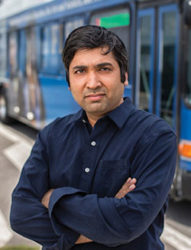Abhishek Dubey, assistant professor of electrical engineering and computer science, is applying artificial intelligence (AI) to address how the essential public transit systems of Nashville and Chattanooga – WeGo Public Transit and CARTA, respectively – can maintain social distancing protocols and proactively plan bus routes and schedules in response to COVID-19.
Beyond concerns transit advocates posed long before the virus gripped every facet of daily life, public transportation faces significant challenges in safely accommodating people who rely on it to live and work during a public health crisis. There is no easy way to ensure accessibility to riders due to myriad new challenges including limited driver availability and time-intensive disinfecting procedures to clean buses between routes. Changes to daily life have also altered ridership patterns, creating planning, service reliability and funding difficulties.

The project has two main goals: to analyze available bus occupancy data to allow passengers and drivers to maintain a healthy social distance and to understand the changes in overall demand for public transit in each city. Working with bus occupancy data the researchers intend to create a real-time map of available seats within social distancing protocols available for public use.
Dubey likens the map to that of how seats are selected on ticket sales websites for concerts or sporting events. The researchers posit that they will further be able to use their algorithm that digests occupancy data to estimate usage and seating patterns. These estimates will be used to make recommendations to WeGo Public Transit and CARTA on the number of buses that need to be added to specific routes to ensure passenger safety.
To facilitate this work, a grant from the National Science Foundation Division of Computer and Network Systems was awarded in June to Dubey, also senior research scientist at the Vanderbilt Institute for Software Integrated Systems (ISIS) and Aron Laszka, assistant professor of computer science at the University of Houston and former research assistant professor at Vanderbilt. The unique skillsets of the co-principal investigators – Dubey’s in resilient system design of cyber-physical systems and Laska’s in security and data protocols – is shaping the way that academic research is applied to current, real-world issues.
The project also has a direct and immediate connection to the development of smart city technologies and can eventually be applied to other transit agencies across the country. Its blend of technical research and community engagement promises to improve the overall resilience of essential public transit services in the face of challenges, pandemic or otherwise.
“Computer science allows us to understand data, see patterns and in this case, apply them to how people move around cities,” said Dubey. “Operational and logistical optimization of vehicles is quite intricate. AI is helping us navigate this complexity. We are excited to leverage this technology and our research for the good of the community.”
The collaborators are working together to leverage machine learning techniques to reduce CARTA’s energy consumption successfully and at ISIS, Dubey was the principal investigator of the team that developed Transit-Hub, a smartphone app that used real-time data feeds to empower riders with predictable and reliable information about public transit.